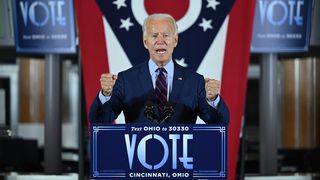With the final full week of the presidential campaign in the United States ahead of us, the polls remain stubborn in pointing to Joe Biden's victory. More pressingly, there is no scarcity of analysts who suggest that 2020 might bring about a blue wave that would see Democrats take control of the White House and Congress, thus creating an opportunity to enact a broad set of progressive reforms.
The potential of such scenario transpiring has been used by both presidential campaigns in their final bids to the voters ahead of the November 3 elections. The Trump campaign has resorted to the standard GOP scare tactics and presented this as a peril that would "turn America into Venezuela". On the other hand, Biden's team is pitching this as a promise to build on some of the foundational progressive policies introduced by Democratic presidents such as Franklin Roosevelt and Lyndon Johnson.
There is no scarcity of analysts who suggest that 2020 might bring about a blue wave that would see Democrats take control of the White House and Congress, thus creating an opportunity to enact a broad set of progressive reforms.
If elected, there is no doubt the imperatives of domestic reconstruction following the worst public health and economic crises in a century will dominate Biden's policy agenda. Strengthening the social safety net with policies that include a public option for healthcare, protecting social security, scaling up unemployment insurance and boosting the federal minimum wage to $US15 an hour rank as top priorities. Moreover, the pandemic has spotlighted the issues for those who find themselves in occupations deemed to be "essential" - from their right to unionise to being allowed paid sick leave and hazard pay. Given there have already been legislative initiatives in the Democrat-controlled House of Representatives on this front, it can only be expected these bills will be sent to the Senate if it changes hands.
Likewise, the need for additional fiscal stimulus will remain since the lessons from the Global Financial Crisis show it is better to err on the side of providing more relief rather than less. Based on Biden's campaign platform, government spending will prioritise addressing the urgency of climate change with the need to improve America's infrastructure. Even though Trump's presidency has largely been a boon to the stock market with his deregulation credo and corporate tax cuts, Wall Street seems to be warming up to Biden's version of the Green New Deal, estimated at $US2 trillion - even if the new president brings about more stringent regulations for the finance sector.
Even though Trump's presidency has largely been a boon to the stock market with his deregulation credo and corporate tax cuts, Wall Street seems to be warming up to Biden's version of the Green New Deal, estimated at $US2 trillion — even if the new president brings about more stringent regulations for the finance sector.
Beyond these immediate concerns, there is plenty we can expect a Biden administration to do on the home front, should it enjoy the luxury of a unified government. There is no doubt there will be a greater role for the federal government to play in setting standards and rolling back Trump-era policies on law enforcement, immigration and gun control. Unlike domestic policies, which are a product of the struggle between Congress and the president, the foreign policy realm offers more latitude for the executive branch to act. Biden will thus push to reverse some of the most controversial Trump policies and work to resuscitate international organisations and deals that have been defanged and rolled back - from the WHO and WTO to the Paris climate agreement and Iran nuclear deal.
The historical moment Biden finds himself in offers a unique chance to implement landmark reforms. Yet conservative critics who have already begun criticising the impending government "takeover" would benefit from reflecting on Barack Obama's first term to understand the constraints every American president faces. Effectively, Obama had only a two-year window to enact some of his principal policy aspirations, and even then he found it hard to convince some of the more recalcitrant members of his own party in Congress. Afterwards, many of his policy promises got shelved, while others got only partially addressed through executive action.
While Biden has more experience in legislative cajoling, much will depend on setting the right priorities and fighting only the battles that are worth it. Moreover, the 2022 midterm elections will be the medium-term reality, and always carry the prospect of Congress changing its ideological makeup in the case of a Republican backlash akin to that of 2010. Finally, given everything is pointing to the confirmation of judge Amy Coney Barrett as the ninth justice of the Supreme Court, a conservative-dominated judiciary will no doubt check the Democratic-controlled legislature and executive, limiting the scope of progressive reform.
The prospect of progressive change is great, but so is the potential reaction to it.






